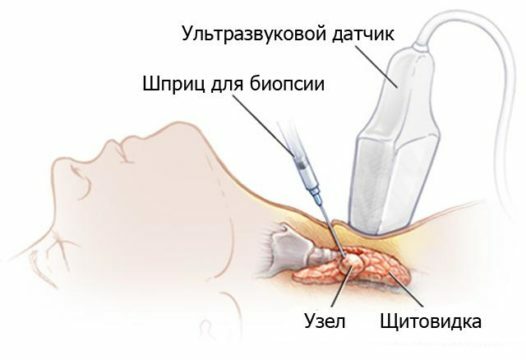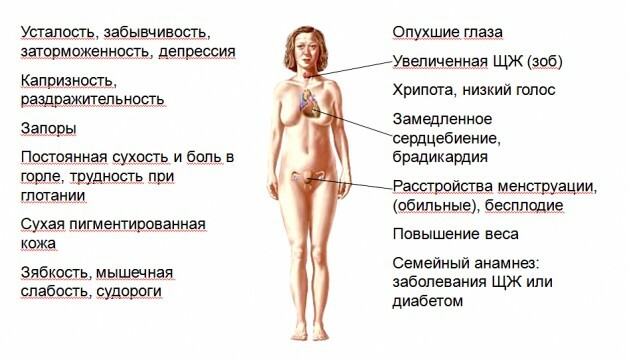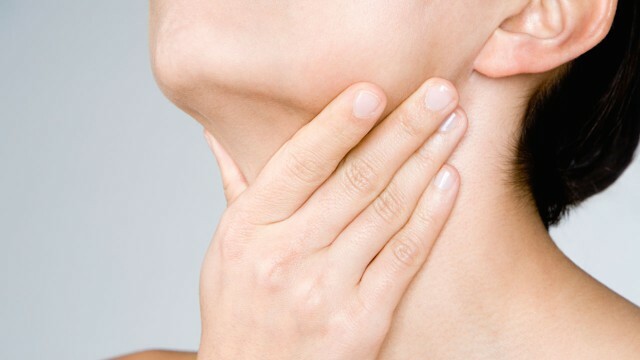The normal course of pregnancy is caused by many factors. In the process of development of the child with the woman, changes occur, not only external, but also internal. The systems of the body work in an intensified, then, on the contrary, slowed-down mode.

The thyroid gland throughout the entire pregnancy should fully perform its functions, since during this period it works on two organisms - the mother and the baby. In the first months of development, the fetus already has its own thyroid gland, but it can not produce hormones on its own. After delivery, many body systems begin to fully restore their functions. Sometimes it happens too much.
What is a postpartum thyroiditis
It is believed that during a woman's pregnancy the immune system works with a slight slowdown, after birth there is a "splash", due to which all the systems in the body begin to activate and cause a large production of hormones and antibodies. As a result, the thyroid gland increases in size. It can manifest in the form of thyroiditis. The disease usually begins with hyperthyroidism, and ends with hypothyroidism, because at some point the body stops producing an increased amount of hormones and, on the contrary, reduces them. The disease is rare.
Postpartum thyroiditis refers to an autoimmune, and is the result of increased activity of the immune system. In the risk group, women - carriers of antibodies to TPO, having type 1 diabetes mellitus or have already been ill with this disease.
Thyroiditis is a disease caused by inflammation of the thyroid gland, as a result of which cell death occurs. It is manifested by a constant feeling of discomfort and painful sensations in the neck. Postpartum thyroiditis is a disease that occurs some time after birth. It develops usually 2-3 months after the appearance of the child and is manifested by the increased work of the thyroid gland. After 5-6 months, the production of hormones falls, and the disease turns into another manifestation.

The disease can have several stages of development:
- Hyperthyroidism is a disease of the thyroid gland, in which there is an increased production of hormones.
- Hypothyroidism is a disease of the thyroid gland, in which the body does not produce the right amount of hormones.
- Hyperthyroidism, which changes into hypothyroidism and vice versa. There are situations when a woman can have hyperthyroidism almost immediately after childbirth, but after 2-4 months, the thyroid gland may recover or vice versa to reduce its production to a minimum, as a result of which hypothyroidism may develop.
Often, after a year, the thyroid gland is restored, but there are situations in which postpartum thyroiditis becomes chronic. In some women, hyperthyroidism or goitre usually develops in this case. In subsequent pregnancies in such women, the disease will most likely be repeated.
Causes and symptoms of
Causes of postpartum thyroiditis:
- Predisposition to the disease or its presence before pregnancy;
- Presence of type 1 diabetes mellitus;
- Acute respiratory diseases transmitted by a woman before or during pregnancy;
- Ecology, improper and monotonous nutrition, lack of vitamins and minerals in the body;
- Stressful situations or frequent nervous disorders;
- Multiple use of iodine and hormone preparations.

Symptoms of the disease depend on the stage of its development:
- At the initial stages, a young mother feels energetic, but a quick change of mood and irritability due to increased levels of hormones in the blood, from the digestive system - weight loss, but a good appetite, increased heart rate and pulse.
- Perhaps protrusion of the eyeball or the appearance of swelling in the neck, due to an increase in the thyroid gland in size.
- Then there are signs of hypothyroidism. There is apathy and drowsiness, fatigue, sometimes even with small loads, a decrease in appetite, but weight gain, swelling and sweating, intolerance to cold, menstrual cycle disorders.
Very often the disease can be unnoticed on time, as the symptoms manifested with it are usually associated with the postnatal instability of the body systems and fatigue of the young mother.
Diagnostics
- Immunogram. It is necessary to check the presence of antibodies to thyroid cells. The level of hormones T3, T4 and TSH is determined to establish the stage of the disease.
- Ultrasound. During the analysis, the condition of the gland is fixed, the presence of tumors and nodes in the gland. In this analysis, an increase in organ size is usually diagnosed.

- Fine needle biopsy. It is conducted to obtain an accurate answer about the malignancy of the nodes detected during ultrasound. It is performed by a thin needle by puncturing the neck. Practically painless procedure, after which the patient can immediately go home. Hospitalization is not needed.
- Scintigraphy. The study, which is carried out with the help of radioactive iodine, by introducing it through a vein. Helps to give the maximum answers about the state of the thyroid gland organ, its shape, contours, the area affected by the disease. The analysis is harmless, the contrast medium undergoes rapid disintegration and excretion from the body.
Treatment of postpartum thyroiditis
No precise treatment for thyroiditis has been developed. It all depends on which form of hormonal abnormality the disease has developed. If the disease is characterized by an elevated level of hormones in the blood, the young mother is prescribed drugs acting on them destructively. Beta-blockers, which restore the cardiovascular system, are also prescribed. But it's worth remembering that this method of treatment can not be used if a woman is breastfeeding. If the disease has led to physical changes, then surgery is performed.
If the disease is characterized by low thyroid function, the patient is prescribed replacement therapy with thyroid hormones. Breastfeeding in this case can not stop.
Most often the symptoms of the disease go through 6-9 months, so it does not need any strong treatment, but it is established that almost 40% of women diagnosed with postpartum thyroiditis are later at risk and predisposed to manifestations of thyroid dysfunction in subsequent years. Therefore, it is desirable after a first course of treatment to take a short break and pass the necessary tests. If the results of laboratory studies are normal, then the functions of the thyroid gland are restored.
Postpartum thyroiditis and breastfeeding
Thyroiditis, depending on the degree of its manifestation, is treated with various medications. If a woman is breastfeeding during a period of illness, the selection of treatment methods should be approached with particular attention. Now in pharmacies a large selection of medications, the use of which in small doses does not contradict pregnancy and, in the future, breastfeeding. Concerning the disease itself, it can be said for sure that it will not be transmitted to the child with milk. But nevertheless it is not necessary to be engaged in self-treatment, only the doctor, after a number of researches should diagnose, appoint preparations and their dosage, safe both for the mother in the period of illness, and for the child.
Forecast
The prognosis of the development of the disease is generally favorable. Correctly diagnosed and prescribed treatment gives the woman the opportunity to virtually get rid of thyroiditis. The disease goes to the stage of long-term remission. If untimely treatment can go into a chronic form.
Prevention
Lifestyle is important in the fight against the disease and preventing its development. It is necessary to exercise regularly, spend a lot of time in the fresh air. Meals should include foods rich in vitamins and minerals. Iodine intake is mandatory, especially in those areas where there are environmental deviations, and this trace element is small in water.
During the entire postpartum period, a young mother must be observed with an endocrinologist, do a blood test to control the level of hormones, and if necessary, an ultrasound of the thyroid gland, since the risk of developing the disease is great for them. Do not ignore the planned visits to the doctor, even if the disease is completely cured.




